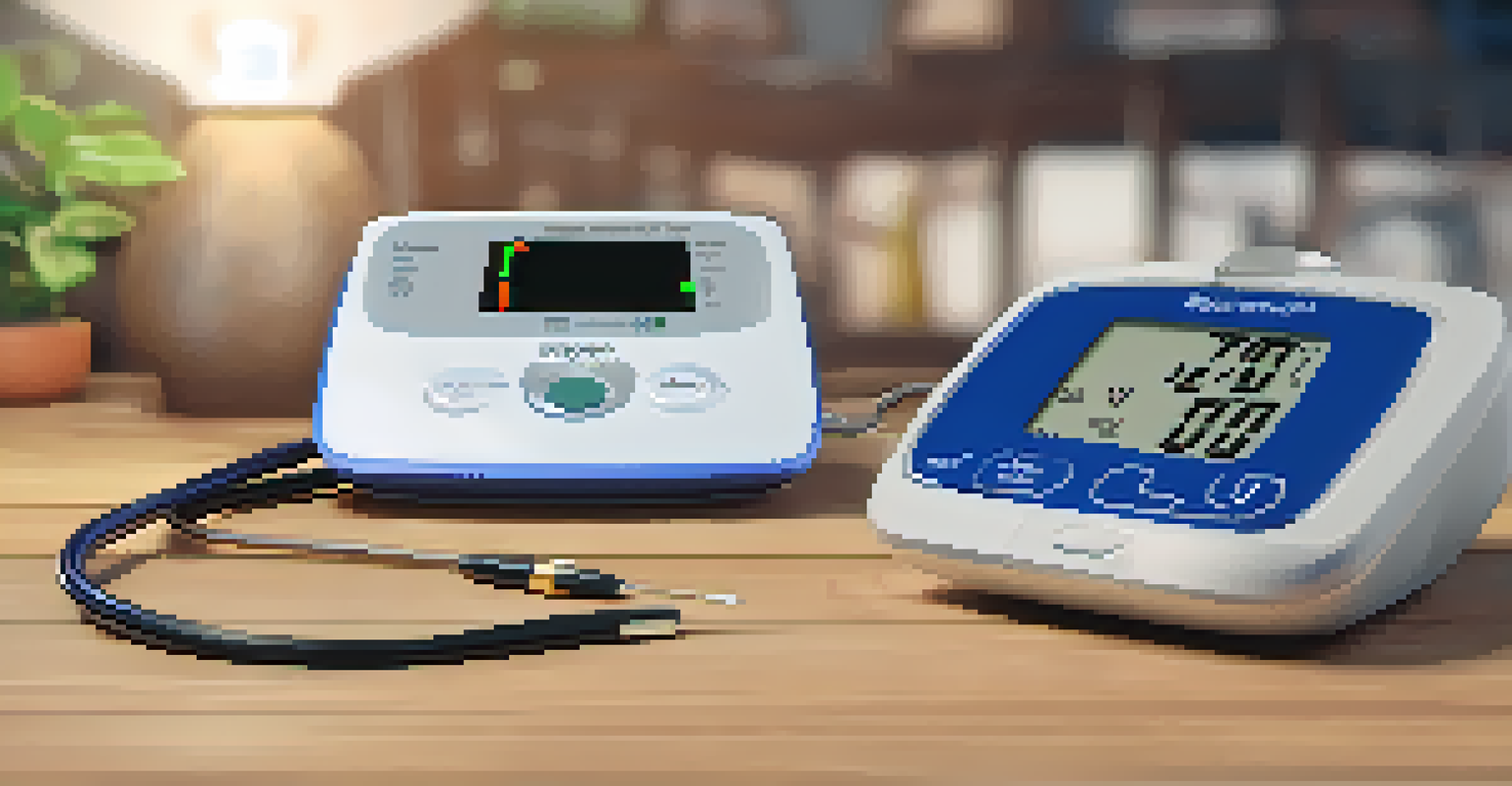Understanding Hypertension: Causes, Effects, and Management

What is Hypertension and Why It Matters
Hypertension, commonly known as high blood pressure, is a condition where the force of blood against your artery walls is consistently too high. This often goes unnoticed, as most people with hypertension have no symptoms. It's crucial to understand hypertension because it can lead to serious health issues, such as heart disease and stroke, if left unmanaged.
The greatest weapon against stress is our ability to choose one thought over another.
The numbers that determine hypertension are quite specific: a reading of 130/80 mmHg or higher is considered high. These numbers reflect the pressure in your arteries during and between heartbeats. Knowing these figures can empower you to take action and advocate for your health.
Hypertension is often referred to as a 'silent killer' because many individuals remain unaware of their condition. Regular check-ups are essential, as early detection can lead to effective management strategies that can significantly improve your quality of life.
Common Causes of Hypertension
Several factors can contribute to the development of hypertension. Lifestyle choices, such as a diet high in salt, lack of physical activity, and excessive alcohol consumption, can elevate blood pressure levels. Additionally, being overweight increases the strain on your heart, making hypertension more likely.

Genetics also play a significant role in hypertension. If your parents or siblings have high blood pressure, you might be at a greater risk. This hereditary aspect highlights the importance of knowing your family medical history.
Hypertension is a silent killer
Hypertension often goes unnoticed but can lead to severe health issues like heart disease and stroke if unmanaged.
Other factors include age, stress, and chronic conditions like diabetes or kidney disease. Understanding these causes can help you identify areas in your life that may need adjustment to prevent or manage hypertension more effectively.
Recognizing the Effects of Hypertension
The effects of hypertension can be far-reaching, affecting not just your heart but also your overall health. Prolonged high blood pressure can lead to damage in the arteries, which can result in heart disease and heart failure. It's like slowly rusting a pipe; the damage builds up over time until it fails.
Take care of your body. It's the only place you have to live.
Moreover, hypertension can lead to complications such as stroke, kidney damage, and vision loss. Each of these conditions can significantly impact your daily life and well-being. Recognizing these potential effects can motivate you to take your blood pressure seriously.
In addition to physical health issues, hypertension can also affect mental health. The stress of managing a chronic condition can lead to anxiety and depression, making it essential to address not only the physical but also the emotional aspects of hypertension.
Lifestyle Changes to Manage Hypertension
One of the most effective ways to manage hypertension is through lifestyle changes. Incorporating a balanced diet rich in fruits, vegetables, and whole grains can significantly lower blood pressure. Think of it as fueling your car with high-quality gasoline; it runs better and lasts longer.
Regular physical activity is also crucial. Aim for at least 150 minutes of moderate exercise each week, which can include activities like walking, swimming, or cycling. This not only helps maintain a healthy weight but also strengthens your heart, making it more efficient.
Lifestyle changes can help manage it
Incorporating a balanced diet, regular exercise, and stress reduction techniques can significantly lower blood pressure.
Additionally, reducing stress through techniques like meditation, yoga, or deep-breathing exercises can have a positive impact on your blood pressure. It’s about creating a lifestyle that supports not just your heart but your overall well-being.
The Role of Medication in Hypertension Management
For some individuals, lifestyle changes alone may not be enough to control hypertension, and medication may be necessary. There are various types of antihypertensive drugs available, each working differently to lower blood pressure. It's essential to work with your healthcare provider to find the right medication for you.
Common medications include diuretics, ACE inhibitors, and beta-blockers. Each of these has its own mechanism and potential side effects, so understanding how they work can help you feel more in control of your treatment plan. Your doctor will guide you through this process, ensuring you make informed choices.
While medication can be effective, it should complement, not replace, healthy lifestyle choices. Combining the two can lead to better outcomes, keeping your blood pressure in check and improving your overall health.
Monitoring Your Blood Pressure at Home
Monitoring your blood pressure at home can be an empowering part of managing hypertension. Home blood pressure monitors are widely available and easy to use, providing you with valuable insight into your condition. It’s like having a personal dashboard that reflects your heart's health.
When measuring your blood pressure, it's important to follow specific guidelines, such as taking readings at the same time each day and sitting quietly for a few minutes beforehand. Keeping a log of your readings can help you and your doctor identify trends and make necessary adjustments to your treatment plan.
Monitor your blood pressure regularly
Home monitoring of blood pressure empowers individuals to track their health and identify trends for better management.
Regular monitoring can also alert you to changes in your blood pressure that may require immediate attention. This proactive approach not only enhances your understanding of your health but also fosters a sense of control over your condition.
When to Seek Medical Attention for Hypertension
Knowing when to seek medical attention for hypertension is crucial for your health. If you experience symptoms such as severe headaches, shortness of breath, or blurred vision, it's essential to contact a healthcare professional immediately. These could be signs of a hypertensive crisis, which requires prompt action.
Regular check-ups are also vital, even if you feel fine. Hypertension is often asymptomatic, and a healthcare provider can help monitor your blood pressure and adjust your treatment as needed. Think of these check-ups as routine maintenance for your body.

Don’t hesitate to reach out to your doctor if you have concerns about your blood pressure management. Open communication can help you stay informed and take the necessary steps to keep your blood pressure under control.